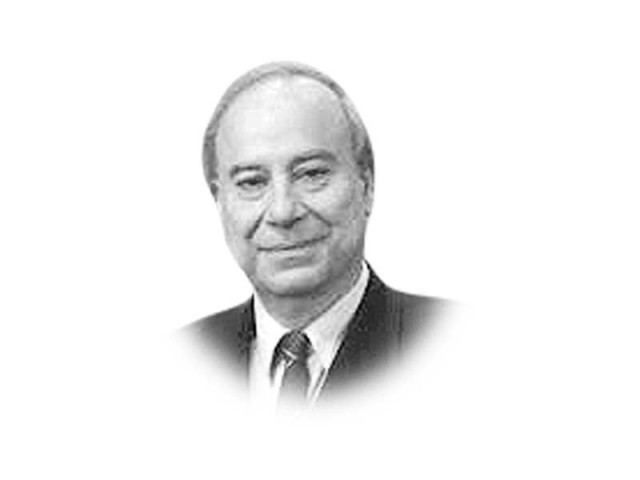1971 field notes: lessons for Pakistan — Part II
All governments must attempt to maintain law and order and at all costs

The writer is the Ibn Khaldun Chair of Islamic Studies at American University in Washington, DC and was former Pakistani high commissioner to the UK and Ireland. He has just completed the fourth book of his award-winning quartet of studies on Islam and the West
By the end of 1971, of the seven West Pakistan CSPs who remained, three had been brutally butchered in the field by rampaging mobs and three were taken prisoner to spend several miserable years in an Indian POW camp. I survived by sheer chance. It was a game of Russian roulette at a time of Apocalypse Now.
In the midst of the madness, because of my posting, I could still perform acts of kindness. I got a well-spoken Bengali couple two coveted plane seats, for example, after I advised them to leave for Karachi and escape from the hungry eyes of the officer who desired the wife. In another instance, I was able to save a senior Bengali CSP officer from serious harm, possibly peremptory execution, by taking bold bureaucratic action. All this was risky stuff and could have cost me my job and worse; recall we lived under martial law and civilian life did not matter much.
As if to confirm the reality on the ground, one quiet afternoon when I was serving as a member of the governor’s inspection team, my friend Major Sabir, in full uniform, came to see me. He walked in, cocked his revolver, and put it to my forehead. He told me to write to the chief secretary of East Pakistan and request emergency leave, as he believed we were in grave danger. I just pushed the paper away and said it was impossible as all leaves were cancelled. Sabir became angry, saying if you stay you will be killed. “What about you? Why are you here then?” I said. He replied, he had married a general’s daughter and he was being sent abroad.
It was therefore a shock for me to hear that when the war began in December, Sabir was still at his post in the northeast of East Pakistan on the border and killed in action. He had refused to surrender to a vastly larger Indian Army force. That year I lost two good and noble friends who went down honourably fighting rather than surrender: Major Sabir and Major Shabbir Sharif.
In late November, I flew to Karachi on short leave given on ‘compassionate grounds’ to be with my wife for the birth of our first child. My daughter’s birth was delayed, and in the meantime all flights to East Pakistan were cancelled and the war began. With her birth I received my official posting order to Peshawar, the one Wali Khan had lobbied for.
It was a traumatic year for my country, my people and me. I was a helpless witness to the destruction of Pakistan, and its demise was like a Greek tragedy in which no one could alter the final act. I felt Pakistan lost due to its incompetent, corrupt and bungling leadership. Pakistan witnessed a humiliating surrender in Dhaka and 100,000 troops were taken into captivity.
We waited in vain for the American fleet and later learned that the Americans had drawn a red line that prevented the Indian Army from crossing into West Pakistan.
I was never to return to what was once East Pakistan.
That was the darkest hour of Pakistan’s history but it may still have lessons for us today.
Firstly, using military force to brutalise a civilian population to solve political problems is not only inhumane, it will almost certainly backfire.
Second, it is crucial that the central government treats its minorities and outlying provinces with honour and dignity. Even today, the smaller provinces complain of being neglected, culturally humiliated and deemed ‘backward’ by arrogant higher officials in Islamabad and the words ‘miscreants’ and ‘terrorists’ are bandied about.
Thirdly, Pakistan needs to reestablish its civil service. When Jinnah in Pakistan and Nehru in India lauded their civil services as the “steel frame” for their nations, they recognised their central importance. Unfortunately, the ways of the CSP attracted jealousy and hatred, and each government diminished it. Today, Pakistan, always own-goal champs, have reduced the services to malleable plastic, making the pursuit of good governance nationwide much harder to achieve.
In this same vein, all governments must attempt to maintain law and order and at all costs. They must check those who would challenge the writ of the state as in Faizabad and on the campus in Peshawar recently, that is a symptom of a dysfunctional state.
Finally, the power elite needs to be far better informed and sensitive to the trends and opinions of their own people and the outside world. Senior civil servants and politicians must be in close touch with field officers nationwide, so as to avoid remaining in an echo chamber. Yayha Khan hiding bizarrely behind a still photograph on television and ordering his army to expel the Indians after the fall of Dhaka summed up the disconnect of that fateful year.
As Santayana famously stated, “Those who do not learn from history are doomed to repeat it.”
(Concluded)
Published in The Express Tribune, December 27th, 2017.
Like Opinion & Editorial on Facebook, follow @ETOpEd on Twitter to receive all updates on all our daily pieces.















COMMENTS
Comments are moderated and generally will be posted if they are on-topic and not abusive.
For more information, please see our Comments FAQ